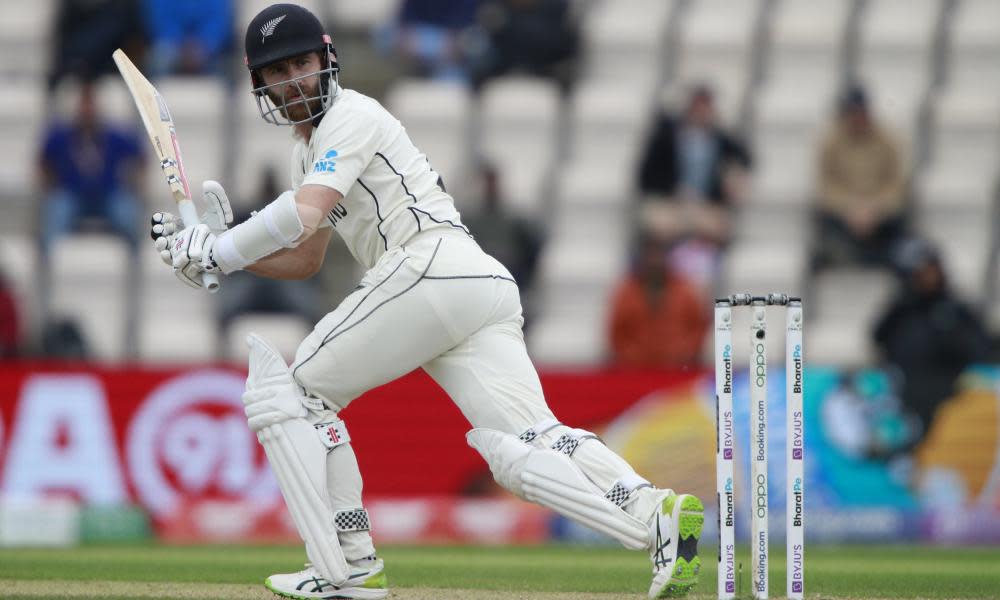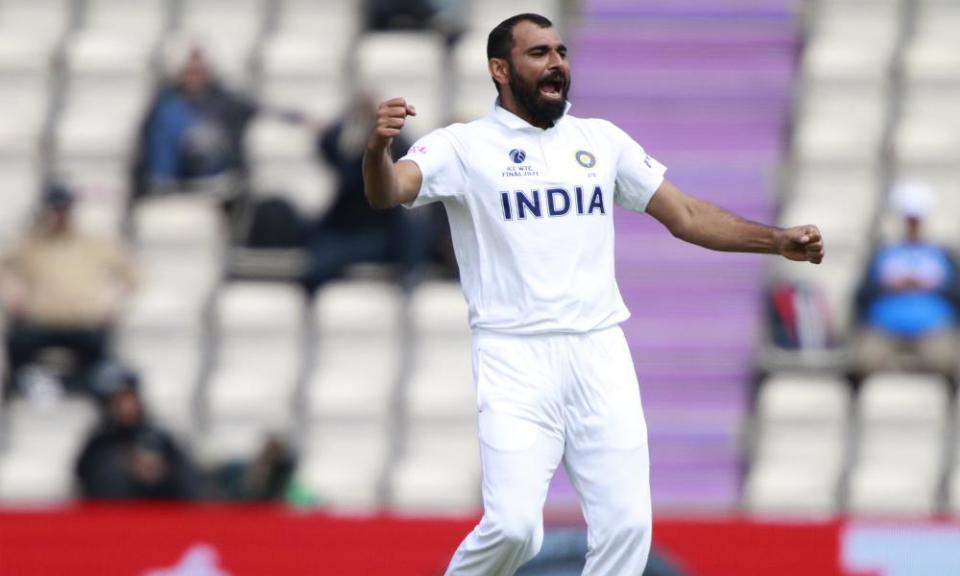Kane Williamson digs in as New Zealand and India take edgy WTC final to last day

Rain and bad light may have decimated the World Test Championship final between India and New Zealand but the match heads into its reserve day with a result still possible following a gripping arm-wrestle between the two sides.
By the time stumps were called on day five India had reached 64 for two in their second innings with a lead of 32 runs. Virat Kohli was unbeaten on eight, his head still ringing after being struck by a Tim Southee bouncer late on, with Cheteshwar Pujara 12 not out following an hour of typical obduracy at the crease.
Related: India v New Zealand: World Test Championship final, day five – as it happened
It represented solid progress for India, who bowled out their opponents for 249 in 99.2 overs before tea thanks to Mohammed Shami’s figures of four for 76. New Zealand’s Southee had struck twice in the final session, trapping Shubman Gill and Rohit Sharma lbw with the latter offering no shot on 30, but a full-blown top-order wobble had at least been avoided.
It leaves a draw as the clear favourite result, something which would see the title shared and an overall prize pot of $1.6m (£1.14m) split in two – although with the forecast encouraging for the denouement, New Zealand’s five-pronged seam attack will return after a night’s rest hopeful of producing another surge.
After all, while the English weather has prompted the gnashing of teeth, the upshot of the moist air and cloud cover has also been unrelentingly tense cricket between the stoppages. The Dukes ball was certainly a constant threat as New Zealand claimed a 32-run first innings lead by tea on the fifth day.

Indeed, after an hour’s delay for rain just 34 runs were added to their overnight total of 102 for two before lunch. Yet it was a captivating spectacle, with Kane Williamson digging in at one end amid a five-hour 49 as his more expressive counterpart, Kohli, saw three of his bowling changes produce instant results at the other.
India’s seamers gave their opponents nothing as Williamson eschewed all risk, with Shami getting Ross Taylor caught by Gill at extra cover for 11 and lighting up BJ Watling’s zing bails for one. Ishant Sharma wiped out Henry Nicholls in between when the left-hander edged one to third slip on seven.
Shami’s reward was a promotion to new-ball duties after the interval. With that came the demise of Colin de Grandhomme, who was caught lbw for 13 to a beauty that nipped in after a succession of outswingers, and the termination of a breezy 21 from Kyle Jamieson when the No 8 attempted a second six.
It might have been a sixth five-wicket haul for Shami in Test cricket but for Williamson surviving a reviewed lbw shout on 32 via umpire’s call. New Zealand’s captain then forged on with Southee to nudge their side past India’s first innings score of 217 as Kohli began to look short of seam options.
But just as Shami and the unrewarded Jasprit Bumrah started to move into the red zone fatigue-wise, Sharma conjured up the key wicket of Williamson when his loose push was gobbled by Kohli at second slip. After 177 balls of resolute defence, his concentration had finally wavered.
The previously underused Ravichandran Ashwin and Ravindra Jadeja may have then shut down proceedings swiftly but with Southee crashing two sixes in a lively 30, New Zealand’s final four wickets had added 87 runs from a perilous 162 for six at the departure of De Grandhomme. India’s tail, by contrast, mustered just 12 between them two days earlier.
How crucial that difference proves to the outcome remains to be seen, so too the loss of a further 10 overs due the morning rain and a sluggish over rate. There are 98 still to be bowled – 83 before the final hour is called – in what now becomes the first six-day Test to be staged in the UK since the one at the Oval in 1975.
That particular match ended in a draw, with Australia retaining the Ashes despite Bob Woolmer’s eight-hour innings of 149. Though a repeat of that result probably looms once more, the dominance of ball over bat during the cricket witnessed this week and two fine attacks mean a telling twist should not be ruled out altogether.

 Yahoo Movies
Yahoo Movies 
